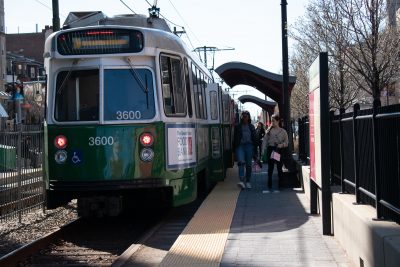
ALI AUDET/ DFP STAFF
Boston Mayor Martin Walsh announced the City will seek to invest $2.78 billion over the next five years in infrastructure projects across Boston. Improvements will focus on various areas including transportation, education, arts and housing.
Mayor Walsh said in a City press release that Boston’s proposed Fiscal Year 2020-2024 capital investment plan will create better opportunities for citizens of Boston today and in future generations.
“This is a budget with a big heart,” Walsh said in the release. “It reflects our best values: our belief that every single person is worthy of dignity and hope and opportunity. It’s going to improve quality of life in all our neighborhoods, and it will continue to generate opportunities for our residents for generations to come.”
The press release detailed plans for investment in initiatives such as a pathway project in Franklin park that will revitalize the entrances and pathways throughout the space, increased funding for permanent public art, and a $30 million investment in affordable public housing.
$1.15 billion will go directly towards implementing the core initiatives of Go Boston 2030, the city’s long term transportation plan that aims to create more reliable transportation for residents who do not have access to quality transportation now, according to the press release.
“Go Boston 2030 [establishes] streets that are safer for all users of City roads and sidewalks,” the press release states, “particularly pedestrians and cyclists; travel that is more reliable and predictable; and quality transportation choices that improve access to interconnect neighborhoods for all modes of travel.”
Stacy Thompson, the executive director of LivableStreets Alliance, a group that advocates for equitable solutions to transportation problems, said it was important to advance equal access to public goods like public transit.
“Transportation, much like education, much like public health, is a public good,” Thompson said. “It’s not a matter of owning a car or choosing a mode, it really is like a person’s ability to get somewhere and a person’s ability to have options to get to that location really determines their economic viability.”
Thompson said equitable transportation is important for every city and that even though good work has been done in Boston, she would like to see the transportation improvement projects move more quickly.
“I would just say that [Livable Streets] has seen some good, specific projects that in terms of like really addressing major networks major corridors or implementing, working with the T to more rapidly implement bus priority, we’d like to see those projects happen much more quickly.”
Thompson said the money invested in the City’s Go Boston 2030 plan will go towards initiatives such as establishing mobility hubs — areas in which residents can access multiple forms of transportations such as public transit, bike share, and rideshare — bike lane networks, dedicated bus lanes and other significant transit priorities.
Gary Forestier, 64, of Reading, said the City does not have the capacity to improve its old infrastructure.
“I would think about the commuter rail and how I want to take that forward,” Forestier said.
Forestier said it is critical to make the city safe and walkable.
“I think we should be very careful with bikes,” Forestier said. “But I think we have to definitely bus. People need to take the stigma off the bus.”
Charlestown resident Linda Garrity, 60, said Boston needed to focus on bike and public transit infrastructure.
“We need more bike lanes,” Garrity said. “We just need a better train transportation system and improve the T.”
Paula Banville, 51, of Dorchester, said that it is important to focus on reducing congestion as Boston’s population grows.


















































































































